de donde viene el viento, el sol y el agua.
Tú que manejas el curso de los ríos,
tú que sembraste el vuelo de tu alma.
Levántate y mírate las manos
para crecer estréchala a tu hermano.
Juntos iremos unidos en la sangre
hoy es el tiempo que puede ser mañana.
Líbranos de aquel que nos domina
en la miseria.
Tráenos tu reino de justicia
e igualdad.
Sopla como el viento la flor
de la quebrada.
Limpia como el fuego
el cañón de mi fusil.
Hágase por fin tu voluntad
aquí en la tierra.
Danos tu fuerza y tu valor
al combatir.
Sopla como el viento la flor
de la quebrada.
Limpia como el fuego
el cañón de mi fusil.
Levántate y mírate las manos
para crecer estréchala a tu hermano.
Juntos iremos unidos en la sangre
ahora y en la hora de nuestra muerte.
Amén.
Contributed by Riccardo Venturi - 2014/1/23 - 04:38
23 gennaio 2014
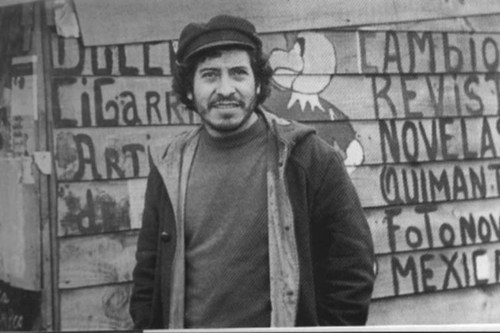
Alzati e guarda la montagna
da dove vengono il vento, il sole e l'acqua.
Tu che cambi il corso dei fiumi,
tu che il volo hai seminato della tua anima.
Alzati e guardati le mani,
per crescere stringile al fratello.
Insieme andremo, uniti nel sangue,
oggi è il tempo che può farsi futuro.
Liberaci da chi ci domina
nella miseria.
Venga il tuo regno di giustizia
e di uguaglianza.
Soffia, come soffia il vento
sul fiore della gola montana.
Lucida come il fuoco
la canna del mio fucile.
Sia fatta alfine la tua volontà
qui sulla terra.
Dacci la tua forza e il tuo valore
nella lotta.
Soffia, come soffia il vento
sul fiore della gola montana.
Lucida come il fuoco
la canna del mio fucile.
Alzati e guardati le mani,
per crescere stringile al fratello.
Insieme andremo, uniti nel sangue,
ora e nell'ora della nostra morte,
amen.
da dove viene il sole il vento e l'acqua
tu che hai bagnato col sangue la tua terra
e hai seminato nei campi la speranza.
Alzati e guarda e guarda le tue mani
stringile a quelle degli altri contadini
perchè è il tempo che può esser domani
la tua fatica grida sotto il sol.
Libera la tua gente da chi la tiene nella miseria
portaci il tuo regno di giustizia e libertà
soffia come il vento sulle ciminiere
canta come il rosso delle tue bandiere.
Dacci il tuo coraggio, il tuo valore nella lotta
venga il tuo regno di uguaglianza qui sulla Terra
soffia come il vento sulle ciminiere
canta come il rosso delle tue bandiere.
Alzati e guarda e guarda la montagna
da dove viene il sole il vento e l'acqua
nella cattiva e nella buona sorte
saremo uniti fino all'ora della morte.
Amen, Amen, Amen.
Contributed by Dq82 - 2020/11/19 - 14:20
Stand up, look at the mountains
Source of the wind, the sun, the water
You, who change the course of rivers,
Who, with the seed, sow the flight of your soul.
Stand up, look at your hands,
Give to your hand to your brother so you can grow.
We'll go together, united by blood,
Today is the day we can make the future.
Deliver us from the master
who keeps us in misery.
The kingdom of justice
and equality come.
Blow, like the wind blows
The wild flowers of the mountain pass.
Clean the barrel
Of my gun like fire.
Thy will be done
At last on earth.
Give us your strength
And courage to struggle.
Blow, like the wind blows
The wild flowers of the mountain pass.
Clean the barrel
Of my gun like fire.
Stand up, look at your hands,
Give to your hand to your brother so you can grow.
We'll go together, united by blood,
Now and in the hour of our death.
Amen.
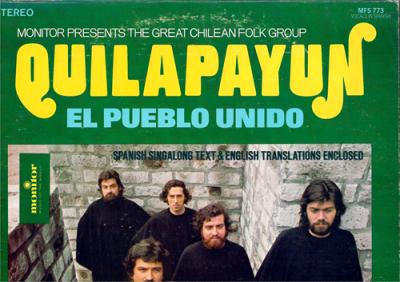
Rise up and look at the mountain
whence comes the wind, the sun, the water
You who change the course of the rivers
You whose seed sows the flight of your soul.
Rise up and look at your hands
Clasp your brother's hands so you may grow.
Together we'll go, united in blood
Today is the time that can be tomorrow.
Free us from the ones that dominate us
in misery
Bring us your kingdom of justice
and equality
Blow like the wind blows the flower
of the mountain pass
Clean the barrel of my gun
as though with fire.
Let your will be done
here on earth
Give us your strength and your courage
to fight.
Blow like the wind blows the flower
of the mountain pass
Clean the barrel of my gun
as though with fire.
Rise up and look at your hands
Clasp your brother's hand so you may grow.
Together we'll go, united in blood
now and in the hour of our death.
Amen.
Contributed by Lorenzo - 2024/8/27 - 21:11
Interpretata da Dean Reed, nella parte di Víctor Jara, nel film per la televisione della Germania Est intitolato “El cantor”, diretto dallo stesso Reed nel 1978.
Dean Reed (1938-1986) è stato un attore, cantautore e regista statunitense che ha vissuto prevalentemente in America Latina e Germania Est, morto suicida (ma le circostanze precise non furono mai ben chiarite) a Berlino Est nel 1986. Era soprannominato “The Red Elvis”…
Bauer steh auf, zum Berg hebe die Augen.
Dort kommt der Wind her, das Wasser und auch die Sonne.
Atme und lebe, bestimm dem Fluss die Wege.
Über dein Leben verfüge endlich selber.
Bauer steh auf, erkenne deine Hände.
Leg sie verschworen und brüderlich in meine.
Dass uns das Blut eint, so stark wie der Gedanke,
Bauer wir kämpfen schon heute, nicht erst morgen.
Wer kann uns befreien von unserem Elend, wenn nicht wir selber.
Selber holen wir uns die Gleichheit und das Recht.
Ehe der Sturm losbricht erhebe dich Nachbar,
wärme dich am Feuer und greif nach dem Gewehr.
Wie du sie dir vorgestellt hast wird deine Erde.
Gib du zum Kämpfen deine Kraft und deinen Mut.
Ehe der Sturm losbricht erhebe dich Nachbar,
wärme dich am Feuer und greif nach dem Gewehr.
Bauer steh auf, erkenne deine Hände.
Bauer steh auf, erkenn deine Genossen,
deinesgleichen im Leben und im Sterben,
in jeder Stunde, im Kampf und bis zum Tod,
bis zum Tod, bis zum Tod.
Contributed by Bernart Bartleby - 2015/3/3 - 10:59
Σήκω και παρατήρησε το βουνό
εξού έρχονται ο αγέρας ο ήλιος τα νερά
της ροής οδηγός εσύ των ποταμιών
εσύ που έσπειρες τη πτήση της ψυχής σου
Σήχω και παρατήρησε τα χέρια σου,
αν θες να μεγαλώσεις σφιξ´τα στο αδερφό σου.
Αντάμα θα βαδίζουμε σμιγμένοι απ´τα αίματά μας
ήρθε καιρός όταν μπορεί έν´ αύριο να χαράξει.
Ελέησον μάς απ´όσους μάς σκλαβώνουν
και μας γυμνώνουν.
Έλθέτω για μας η βασιλειά σου ισότης
και δικαιoσύνης
Φύσα όπως φυσά ο αγέρας πάνω στα άνθη
στα λαγκάδια.
Σαν φλόγα κάμε του ντουφεκιού μου
να λάμψει η κάννη
Γεννηθήτω επί τέλους το θέλημά σου
εδώ επί της γης μας.
Δος ημίν τ´επιούσια σου στην μάχη
ανδρεία.
Φύσα όπως φυσά ο αγέρας πάνω στα άνθη
στα λαγκάδια.
Σαν φλόγα κάμε του ντουφεκιού μου
να λάμψει η κάννη.
Σήχω και παρατήρησε τα χέρια σου,
αν θες να μεγαλώσεις σφιξ´τα στο αδερφό σου.
Αντάμα θα βαδἶζουμε σμιγμένοι απ´τα αίματά μας
νυν και κατά την ώρα του θανάτου μας.
Αμήν.
Contributed by Gian Piero Testa - 2014/1/30 - 13:46
Magyar fordítás Holnapután Anarchista újságtól.
Kelj fel és járj, és nézz a messzi csúcsra,
lement a nap, de holnap ott kel újra.
Új medret adsz a hömpölygő folyónak,
elveted lelked, s kisarjad a holnap.
Kelj fel és járj, s a két kezedre nézz le,
hogy rátalálj, a sok testvéri kézre.
Rabszolga népe a vérnek és a szónak,
akarnod kell, s ma eljön még a holnap.
Szabadíts meg minket a gonosztól, aki nyomorgat,
Jöjjön el a te országod s az igazság!
Jöjj, ahogy a szurdokon vágtat az orkán,
Tisztítsd meg a földet, mint puskacsövet a tűz!
Legyen meg a te akaratod, végre itt a földön,
Adj nekünk erőt a te erődből, csatába űzz.
Jöjj, ahogy a szurdokon vágtat az orkán,
Tisztítsd meg a földet, mint puskacsövet a tűz!
Kelj fel és járj, s a két kezedre nézz le,
hogy rátalálj a sok testvéri kézre.
Legyünk mi egyek a vérben és a szóban,
most és halálunk óráján,
Ámen!
Contributed by Riccardo Venturi - 2014/1/23 - 06:48
da Unsongs (2014), compilation di canzoni censurate da tutto il mondo.
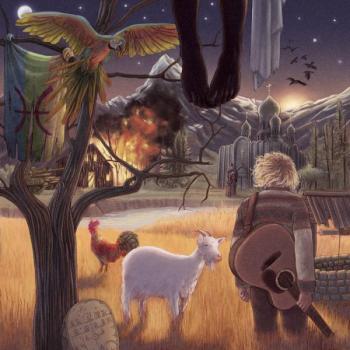
Written by Chilean musician and theatre director Víctor Jara.
Translation by Pål Moddi Knutsen and Maren Skolem.
Our labourer who art beneath the dark sky
Thine is the toil, the peril and despair
You who can tame the forces of the river
You who can shape tomorrow with your hands
Our labourer who art among your brothers
Thine is the day, the power and the soil
Glory be sown, and harrowed be the acres
Reach out your hand to see a new day grow
Lead us not to misery, deliver us from domination
Kingdom of fairness and justice for all, kingdom come
Blow like the wind through the blossoming quebradas
Scour like the fire from the mouth of my gun
Finally, your will be done in factories and farmyards
Give us this day the strength and the courage to fight
And blow like the wind through the blossoming quebradas
Scour like the fire from the mouth of my gun
Our labourer of quarries, quays and chimneys
Reach out your hand and see a new day grow
We’ll go together, this is the blood that binds us
for ever and ever till death do us apart
Amen!
Contributed by Dq82 - 2017/1/7 - 10:28
Source of the sun, of water and the wild wind
You who can harness the rush of mighty rivers
You who can gather the harvest of your soul.
Stand up and see the hands with which you labor
Reach out to hold your brother's hand in your hand
Growing together by ties of earth united
Knowing together the future can be now.
Yea, deliver us, deliver us from those who command us
Teach us the strength to take our share of the sun
Blow like the high wind thru wild mountain flowers
Cleansing like flame the barrel of my gun.
Give us this day a world where no man is master
Our kingdom come on earth, let our will be done
Blow like the high wind thru wild mountain flowers
Cleansing like flame the barrel of my gun.
Stand up and see the power of the mountain
Reach out to hold your sister's hand in your hand
Growing together by ties of earth united
Now and in the hour of death, amen!
Contributed by Juha Rämö - 2019/6/24 - 17:07
E grazie anche per la tua bella introduzione, che mi conferma ancora una volta quanto sia importante su queste pagine dedicare sempre più attenzione alla storia, alla lettura, all'interpretazione dei testi che vengono contribuiti. Perchè le CCG non sono un semplice, asettico database come ce ne sono tanti ma hanno un'anima e un cuore - anzi, più di uno - che bisogna sforzarsi di far respirare e palpitare.
Io, nel mio piccolo, cerco di farlo, pur non pretendendo di eguagliare gli indiscussi maestri, ossia tu e GPT, che possedete di vostro una sensibilità ed una cultura inarrivabili per il sottoscritto... Sento infatti che senza la dovuta attenzione all'anima e al cuore, noi qui potremmo trasformarci in biechi "copypaster" - come per qualche giorno mi sono firmato nel recente passato - e smarrire il senso di questa esperienza...
E' un appello che faccio a tutti i contributori...
E sarebbe anche bello se si riuscisse anche a svelare l'anima e il cuore non solo dei testi ma anche delle musiche, solo che non so se tra di noi ci sia la competenza... Io purtroppo non ce l'ho, nemmeno questa.
Saluti
Bernart Bartleby - 2014/1/23 - 08:18
Riccardo Venturi - 2014/1/23 - 18:39
Anche l'interpretazione di Victor, asciutta e appassionata, resta inarrivabile e si stacca da quella di molte sue altre composizioni, che pur belle vennero spesso riarrangiate e reinterpretate (dagli Inti ma non solo) con risultati più apprezzabili.
Anni fa in Chile orecchiai in una radio la Plegaria in versione rock e ne rimasi colpito, perché pur snaturata nello stile ne manteneva afflato e spirito. Non sono mai riuscito a capire chi la cantava, ma questa versione del Chancho en Piedra la ricorda molto:
marculivic - 2016/11/30 - 00:22
B.B. - 2019/6/24 - 20:50
Alzati e corri e mira la montagna
donde ti arrivano vento sole ed acqua
tu che utilizzi il corso dei torrenti
che hai seminato il volo del tuo cuore
Alzati e corri e mira le tue mani
stringile salde a quelle di un fratello
sempre voi siete uniti nel dolore
oggi è quel tempo che può essere domani
portaci la vittoria sulla miseria
portaci il tuo regno di pace e uguaglianza
soffia come il vento sui fiori...
....
Venga la tua volontà qui sulla terra
Donaci il coraggio per la battaglia
soffia come il vento sui fiori...
....
Alzati e corri e mira le tue mani
stringile salde a quelle di un fratello
sempre voi siete uniti nel dolore
voi siete l'ora della nostra morte
Amen, Amen, Amen.
Contributed by Dq82 - 2020/11/19 - 14:33
Note for non-Italian users: Sorry, though the interface of this website is translated into English, most commentaries and biographies are in Italian and/or in other languages like French, German, Spanish, Russian etc.








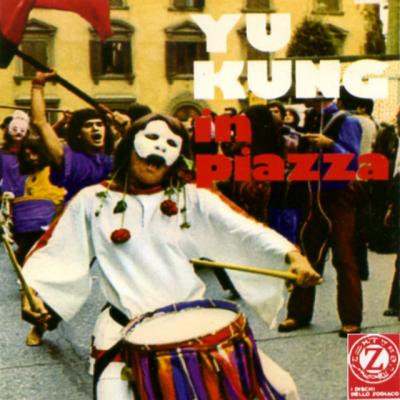
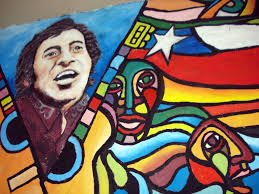
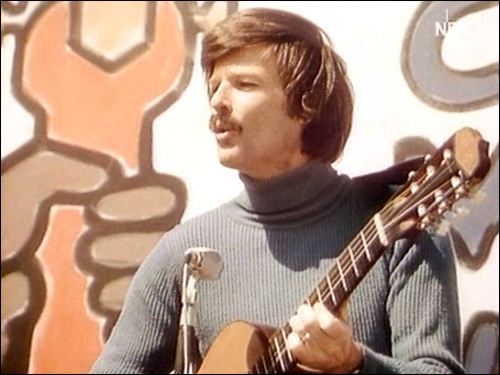
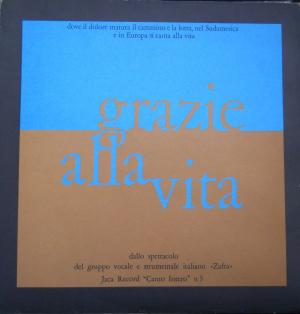
Testo di Víctor Jara
Musica di Víctor Jara e Patricio Castillo
Intrerpretata anche dai Quilapayún
Altri interpreti: Mercedes Sosa, Maria Farandouri
Letra de Víctor Jara
Música de Víctor Jara y Patricio Castillo
También interpretada por Quilapayún
Otros intérpretes: Mercedes Sosa, Maria Farandouri
Lyrics by Víctor Jara
Music by Víctor Jara and Patricio Castillo
Also performed by Quilapayún
Further performances by Mercedes Sosa, Maria Farandouri
Ave Fucile
di Riccardo Venturi
Non saprei nemmeno dire se questa canzone è una delle celebri “dimenticanze” di questo sito, oppure se non sia mai stata inserita per qualche altro motivo; fatto sta che non c'era. Come sempre, stamani la cercavo assolutamente certo che ci fosse; “urgeva rimediare”.
Però, come per ogni canzone che autenticamente segna un'epoca intera, e un luogo intero, non è affatto semplice presentarla. Attualmente, non saprei nemmeno dire quanti la conoscano o perlomeno se ne ricordino; per un certo periodo è stata una canzone che ha goduto una (giusta) fama mondiale, e che è stata interpretata in tutto il mondo (ne fa fede, ad esempio, la versione di Maria Farandouri). Si potrebbe aggiungere che, ascoltando questa canzone e leggendone il testo, si capisce definitivamente perché a Víctor Jara sia toccata la sua sorte. Una canzone, e una condanna a morte al tempo stesso.
La Plegaria a un labrador era una chiamata alla lotta contadina. Un richiamo a coloro che lavoravano la terra con le proprie mani e producevano i suoi frutti affinché si unissero coi propri fratelli nella lotta per una società giusta. Víctor Jara la scrisse nel 1969, un anno prima che Salvador Allende fosse eletto presidente; e l'elezione di Allende significò in primis due cose. La nazionalizzazione del rame, e la riforma agraria. Una canzone del genere, si può dire, valeva cinquemila programmi; radicato com'era nella profondità del Cile, al pari di Violeta Parra, Víctor Jara sapeva che cosa aveva composto. Nello stesso 1969, presentò la canzone al “Festival de la Nueva Canción”, accompagnato dai Quilapayún: lo vinse praticamente per acclamazione. La Plegaria a un labrador è una canzone nata già storica.
La forma della canzone ne asseconda il titolo, del quale si parlerà meglio dopo. E' una preghiera, e in particolare ricorda quella fondamentale, il Padre nostro. Non è un caso; un artista autenticamente radicato nel popolo com'era Víctor Jara non poteva disinteressarsi delle forme e delle espressioni della religiosità; altrettanto interesse nutriva per la poesia e per i valori umani espressi nelle sacre scritture. Scelse il titolo di plegaria (che si pronuncia “plegària”, non “plegarìa” come pressoché tutti fanno); e qui c'è da fare qualche considerazione. Una generica “preghiera”, in lingua castigliana, si dice oración, o rezo. Il verbo “pregare” in senso religioso è comunemente rezar. Etimologicamente, è chiaro che plegaria corrisponde al nostro “preghiera”; ma non si tratta della stessa cosa. In castigliano, la plegaria è l'Angelus.
L'Angelus è la preghiera che ricorda il mistero dell'incarnazione; il suo nome le deriva dalla parola iniziale del testo in latino, Angelus Domini nuntiavit Mariae. Consiste di tre brevi testi che raccontano tale episodio, recitati come versetti e responsorio, alternati con la preghiera dell'Ave Maria. Si tratta, come è facile vedere, esattamente della struttura di questa canzone: tre brevi strofe inframezzati da un “ave” di lotta e di unione, da un Ave Fucile.
L'Angelus è recitato tre volte al giorno: all'alba, al mezzogiorno e al tramonto. Segnando le ore fondamentali della giornata di lavoro (il suo inizio, la parte centrale e la fine), è la preghiera per eccellenza del mondo contadino. I contadini regolavano la loro giornata nei campi coi rintocchi di chiamata dell'Angelus; è l'immagine di uno dei più celebri dipinti del XIX secolo, l'Angelus di Jean-François Millet:
Víctor Jara, quindi, scelse proprio la preghiera più importante per il mondo contadino, quella che segna le ore. La sceglie e la trasforma in una chiamata non più alla riflessione e alla contemplazione di un mistero, ma all'unione e alla lotta concreta. Alla lotta armata, come del resto fa, continuamente, la Bibbia. E anche Gesù Cristo stesso, che nei Vangeli è venuto a portare la spada. Si capisce quindi la dirompenza rivoluzionaria di questa canzone rivolta specificamente al mondo contadino, e che senz'altro è un'espressione anche del particolare background sudamericano, dove il sentimento religioso e la lotta per il cambiamento radicale della società si sono incontrati spesso (si pensi a Ernesto Cardenal, a Camilo Torres, a Hélder Câmara, alla teologia della liberazione, a monsignor Romero).
Al mondo contadino, dicevo. Il titolo della canzone non si ferma qui. In castigliano, il verbo corrispondente etimologicamente al nostro “lavorare”, labrar, significa esclusivamente: “lavorare la terra”. Oppure anche “zappare”, “coltivare”. “Lavorare” in senso generico, come tutti sanno, è trabajar; per cui, labrador riporta immediatamente al mondo contadino, mente trabajador a quello operaio e salariato. Entrambi i termini sono derivati dalla durezza del lavoro: paragonata a una forma di tortura nel caso di trabajar (da *tripaliare, derivato da tripalium, tortura consistente nel fissare il condannato a tre pali piantati in terra), e alla fatica immane in quello di labrar (da laborare, derivato da labor, propriamente “vacillo, barcollo trasportando un peso gravoso”). Nell'atmosfera che precedette l'elezione di Allende, l'unione tra i lavoratori salariati, il mondo contadino e quello intellettuale era l'obiettivo politico per il cambiamento radicale della società cilena in senso socialista; e tutto veniva messo in musica (persino lo stesso programma politico di Unidad Popular). Il mondo contadino si ritrovò in questa canzone, espressa in forme che gli erano familiari; e altro non poteva essere, dato che Víctor Jara stesso proveniva da quel mondo.
A lungo si è creduto che anche la musica della Plegaria fosse dovuta esclusivamente a Víctor Jara; ma è la stessa moglie, Joan Jara, nel suo libro "Víctor Jara. Un canto truncado" (1983) ad affermare quanto segue: “Víctor lavorò specialmente assieme a Patricio Castillo nello sviluppo della musica (della Plegaria)". Ne La Nueva Canción Chilena (1988), Osvaldo “Gitano” Rodríguez è ancora più esplicito: “Quanto alla musica della Plegaria di Víctor Jara, lo spartito dovrebbe essere firmato anche da Patricio Castillo, dato che fu lui che strutturò il ritornello cantato più rapidamente”; tutte cose confermate dallo stesso Castillo.
È ora, quindi, di andare a recitare anche noi questo Angelus dove il fuoco lucida la canna del fucile. Una canzone che ha spezzato le mani a chi l'ha scritta. Una canzone che non cessa di impressionare per la sua terribile bellezza, per le folate di vento che agita. [RV]